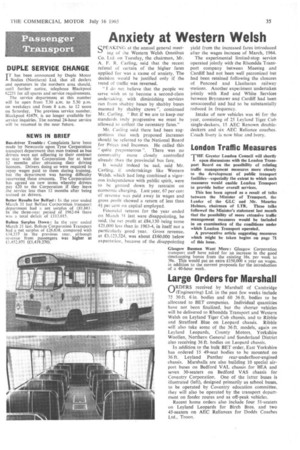Anxiety at Western Welsh
Page 37

If you've noticed an error in this article please click here to report it so we can fix it.
QPEAKING at the annual general meet
ing of the Western Welsh Omnibus Co. Ltd. on Tuesday, the chairman, Mr. A. F. R. Carling, said that the recent refusal of certain of the higher fares applied for was a cause of anxiety. The decision would he justified only if the trend of traffic was reversed.
"1 do not believe that the people we serve wish us to become a second-class undertaking, with diminishing services run from shabby bases by shabby buses manned by shabby crews ", continued Mr. Carling. " But if we are to keep our standards truly progressive we must be allowed to collect the necessary fares."
Mr. Carling said there had been suggestions that such proposed increases should be referred to the National Board for Prices and Incomes. He called this "quite preposterous ". There was no commodity more closely controlled already than the provincial bus fare.
It would indeed be sad, said Mr. Carling, if undertakings like Western Welsh. which had long combined a vigorous independence with public spirit, were to be ground down by restraint on economic charging. Last year, 67 per cent of revenue was paid away in wages and gross pront showed a return of less than 4+ per cent on capital employed.
Financial returns for the year ended on March 31 last were disappointing, he said, the net profit at £84,130 being some £21,000 less than in 1963-4, in itself not a particularly good year. Gross revenue, at £3,123,324, was about £160,000 below expectation, because of the disappointing
yield from the increased fares introduced after the wages increase of March, 1964.
The experimental limited-stop service operated jointly with the Rhondda Transport company between Maesteg and Cardiff had not been well patronized but had been retained following the closures of Pencoed and Llanharan railway stations. Another experiment undertaken jointly with Red and White Services between Brynmawr and Cardiff had been unsuccessful and had to be substantially reduced in frequency.
Intake of new vehicles was 46 for the year, consisting of 25 Leyland Tiger Cub single-deckers, 15 AEC Renown doubledeckers and six AEC Reliance coaches. Coach livery is now blue and ivory.




























































































































